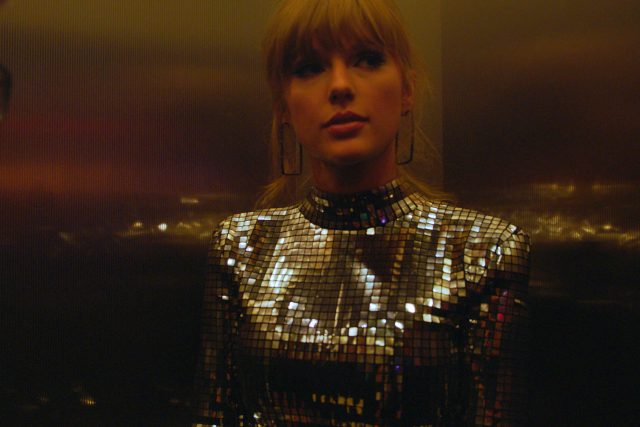Sundance 2020: Miss Americana, by David Bax

If you’re coming to Lana Wilson’s Taylor Swift: Miss Americana looking for a frothy, fan-service documentary, well… Actually, to some extent, you’ll get it. The movie has deeper and more personal concerns but, among all that, there’s fun, cute stuff with pets (a kitten walking across the piano keys while Swift is playing or a giant dog barking at the image of itself on the television) and food (Swift uses her face to keep her airplane meal from falling on her during turbulence in order to protect her Rihanna shirt and proudly shows her producer her method of putting tortilla chips inside a burrito “for crunch”).
Wilson follows Swift from the promotional tour for 2017’s Reputation through the writing, recording and release of last year’s Lover, which happens to coincide with the era between the fallout from Kanye West’s “Famous,” in which he calls Swift a “bitch” and takes credit for her career, and her newfound political outspokenness. Before that, though, Wilson gives the uninitiated a primer in her subject’s life and career.
Those not already in dismay of West’s provocations may become so when, in watching Miss Americana, they find out what many of us have always known, that Swift is not and has never been some prepackaged commodity. She’s an artist and some of the movie’s most stunning and revealing moments depict her in the studio or working and writing at home alone. The creative process is a difficult thing to capture in cinema but the look in Swift’s eyes when she lands on a new and better lyric or direction for a song speaks volumes about what it means and feels like to make art.
She gets a similar look when making the decision to speak out about her political beliefs, a look not of opportunism but one that says, “This is what I need to be doing right now.” That makes it all the more pathetically hilarious when we see her management team try to dissuade her from making statements by pointing out that Bob Hope and Bing Crosby never did anything like that. Swift, to her credit, refrains from laughing in their faces and instead makes a cogent point about how the people she’s opposing “aren’t your dad’s Republicans.”
Still, Miss Americana is not actually about politics any more than it’s about kittens and burritos. It’s first a portrait of the person Taylor Swift was, of the mix of gusto, talent and crippling insecurity that forms celebrities. The trained smile on Swift’s face in earlier years is, in retrospect, transparently desperate, as is the yearning for award show validation that defined her. Why anyone gives a fuck about a Grammy still confounds me but then I’m not the type of person who was ever likely to be nominated for one. Wilson may pull a punch here or there to spare her subject’s feelings. For instance, the common accusation that Swift has excelled at “playing the victim” actually has some merit but, once again, that’s how famous people are built. In the end, though, Miss Americana is a portrait of Swift as she is now, having grown, looked at her success and decided that what’s next is to use it as a force for good. In other words, she’s evolved into something more than a celebrity.




























